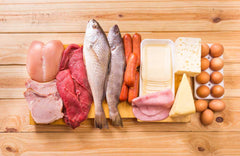
The abundance of protein here in the West is something that many of us take for granted. The custom of eating meat with almost every meal is pretty common and usually results in adequate protein intake. Photos of famine-struck areas featuring thin-limbed victims with distended bellies are a horrifying example of a protein deficiency known as
kwashiorkor. While this is rare in the United States, food insecurity still exists for many. Here in the U.S., workers on tight schedules, the homeless, the housebound, the elderly, and children, residents of "food deserts" with limited dietary choices, and
many others still eat far too many "empty-calorie" foods that are low in protein and other essential nutrients. So how can you be sure that you’re getting enough protein? Read on.
The Basics: Getting Protein from Food
Protein is composed of 20 amino acids. Nine of these amino acids are "essential" because they can’t be made in the body and must be obtained from food. Protein is found in meat, poultry, fish, eggs, dairy products, beans, legumes, nuts, and grains. A vegetarian diet that contains eggs and dairy products can easily provide adequate protein. For vegans, grains can be combined with beans to provide a better balance of amino acids than either food alone.
How Much Protein Do You Really Need?
As a general rule, approximately 10% to 35% of your calories should come from protein. This translates to 46 grams of protein for the average woman and 56 grams for the average man. Active people will need more and children less. Pregnant women may require as much as 71 grams daily. Athletes, body builders, and those who perform heavy physical labor have a greater need for protein than others. Since muscle is made of protein, individuals who work out require extra protein to build lean tissue. Protein is also the major component of hair, skin, and nails, which makes it a natural beauty food. Many women who cut calories in an effort to be thin may wind up with less than adequate amounts of protein in their diets. In these cases, the body uses lean tissue as an energy source. When weight is regained, it’s usually in the form of fat. Symptoms of protein deficiency include muscle weakness, fatigue, depression, insomnia, skin conditions, headaches, and other problems.
How to Increase Your Protein Intake
A diet high in meat will provide adequate protein but can also contain a lot of unhealthy fat. If you eat a lot of meat, consider choosing lean cuts and try to consume fish in place of meat at several meals. Vegans or those who don't have much time to prepare nutritious food can benefit from protein shakes made with juice or milk (dairy, soy, almond or other) and a generous scoop of protein powder. While whey protein from cow's milk is a popular option, dairy-free proteins derived from peas, brown rice, soy or other foods are widely available.
The Benefits of Whey Protein
Whey protein is considered a “superfood” by many. It typically contains immune-boosting immunoglobulins and lactoferrin as well as branched-chain amino acids. Research shows that branched-chain amino acids (leucine, isoleucine, and valine) found in whey have longevity benefits.
1 Whey is a rich source of dietary cysteine. This amino acid is a precursor to glutathione, a powerful antioxidant which combats disease, aging, and oxidative stress.
Vegetable-Based Protein Options
Although whey protein is perhaps the most popular protein supplement, many health enthusiasts are now turning to vegetable-based proteins. The combination of pea and rice proteins, for example, is comparable to whey protein in digestibility and absorption. In addition, vegetable-based proteins offer a variety of health benefits. Pea protein and other plant-based proteins have been shown to exert a positive impact on blood pressure and blood lipid levels.
2-3
The Bottom Line
Health-conscious people make a great effort to ensure that all of their vitamins are taken in the right amounts, but they often forget about protein. If you’re one of those whose protein intake is less than optimal, adding it to your diet can make a huge difference in your life. For example, you may notice better skin, hair, mood, and even muscle growth after increasing your intake. Try it, and see what you may have been missing!
References:
-
Cell Metab. 2010 October;12(4):362-72.
-
J Agric Food Chem. 2003 Sep 10;51(19):5680-7.
-
Arch Intern Med. 2009 Jun 8;169(11):1046-54.
 The abundance of protein here in the West is something that many of us take for granted. The custom of eating meat with almost every meal is pretty common and usually results in adequate protein intake. Photos of famine-struck areas featuring thin-limbed victims with distended bellies are a horrifying example of a protein deficiency known as kwashiorkor. While this is rare in the United States, food insecurity still exists for many. Here in the U.S., workers on tight schedules, the homeless, the housebound, the elderly, and children, residents of "food deserts" with limited dietary choices, and many others still eat far too many "empty-calorie" foods that are low in protein and other essential nutrients. So how can you be sure that you’re getting enough protein? Read on.
The abundance of protein here in the West is something that many of us take for granted. The custom of eating meat with almost every meal is pretty common and usually results in adequate protein intake. Photos of famine-struck areas featuring thin-limbed victims with distended bellies are a horrifying example of a protein deficiency known as kwashiorkor. While this is rare in the United States, food insecurity still exists for many. Here in the U.S., workers on tight schedules, the homeless, the housebound, the elderly, and children, residents of "food deserts" with limited dietary choices, and many others still eat far too many "empty-calorie" foods that are low in protein and other essential nutrients. So how can you be sure that you’re getting enough protein? Read on.
